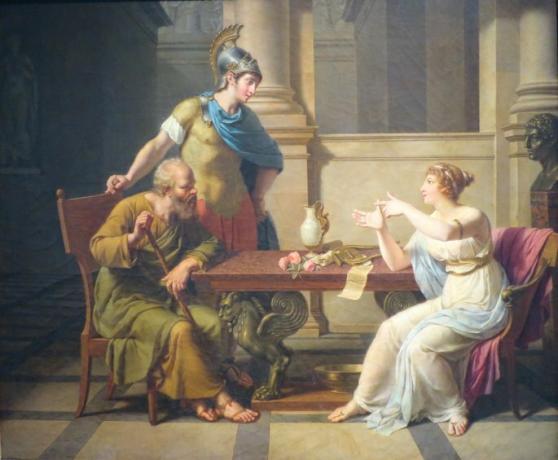According to the classical tradition of Western philosophy, the first theorist to formulate a more systematic thought based on rational foundations was the Greek Thales (circa 625 BC. Ç. – 558 a. Ç.). As the founder of this new way of thinking, he is considered the first known philosopher, inaugurating the philosophical lineage of the pre-Socratics (philosophers who came before Socrates).
Born in the city of Miletus, a Greek colony in the region of Ionia (present-day Turkey), Thales was a mathematician, astronomer and businessman. Heir to even more ancient knowledge - such as Egyptian mathematics and Babylonian astronomy - Thales was held in his town as a sage, but also as a practical man: it is said that, using his skills, he knew how to prosper as a skilled merchant.
What we know about the ideas of this philosopher results from comments made by Greek thinkers who followed him, as there are no preserved written records of his authorship. The main references we have about him come from the philosopher Aristotle.
Tales inaugurated in philosophy the current of "physical" thinkers: philosophers who sought to understand and explain the origin of physis — Greek word translated as nature, but whose meaning also encompasses the idea of origin, movement and transformation of all things.
According to Thales, the origin of all things was in the water element: when dense, it would turn into earth; when heated, it would turn into vapor that, when cooled, would return to a liquid state, thus ensuring the continuity of the cycle. In this eternal movement, little by little new forms of life and evolution would develop, originating all existing things.
Taking a critical look, the gaps in this reasoning become evident. For example, what starts this movement and what keeps it going? How could a single element, water, change into something else?
Do not stop now... There's more after the advertising ;)
These flaws, which in today's scientific eyes are evident, were seen differently at the time. It is worth remembering that at the time Thales' ideas were created, rational and philosophical thoughts were still heavily populated by magical and mythological elements. So to an ancient Greek, the idea that something as simple as water could change into something else was not far-fetched.
Thales' great merit, in fact, was not his aquatic explanation of reality: it was the fact that for the first time in the story, the man sought a totally rational explanation for his world, leaving aside the interference of the gods.
Thales can also be said to be the father of the Unitarian philosophy - which seeks the explanation of all things to starting from a single principle (in his case, water) - and which would have its greatest exponent in the figure of Heraclitus of Ephesus.
Based on his theory, several pre-Socratic philosophers sought their own ways to explain the physis. Thales, Anaximander and Anaximenes formed the trio of the so-called School of Miletus and became known as the physiologist (scholars of physis). It was the beginning of philosophy and the human effort to understand the spectacle of existence based on rationality.
See more:
Anaximander- Find out who was Anaximander, the disciple of Thales of Miletus
Anaximens - Meet Anaximander's disciple and philosopher
Luciano Vieira Francisco
Brazil School Collaborator
Graduated in History from Cruzeiro do Sul University – UNICSUL
Specialist in Teacher Training for Higher Education at the Asunción University Center – UNIFAI
Master in Social History from the University of São Paulo - USP
Would you like to reference this text in a school or academic work? Look:
FRANCISCO, Luciano Vieira. "Tales of Miletus: It All Begins in Water"; Brazil School. Available in: https://brasilescola.uol.com.br/filosofia/tales-mileto.htm. Accessed on June 27, 2021.

